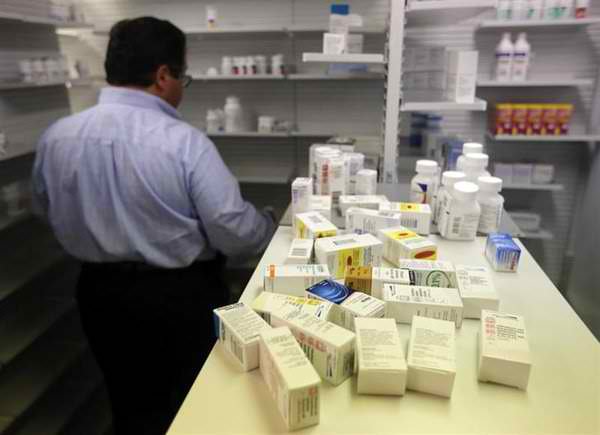The seventh time Catherine Duff contracted C. diff, a debilitating infection of the gut, she did not
respond to antibiotics. She believes her life was saved by a transplant of her husband’s feces.
Several companies are now testing their own variations of fecal microbiota transplantation (FMT) in a race to market a treatment for a stubborn bacterial infection that kills 29,000 Americans every year.
Cambridge, Massachusetts-based Seres Therapeutics Inc and Roseville, Minnesota-based Rebiotix Inc have begun late-stage trials of their respective treatments, with the latter company aiming to launch a product by the middle of 2019.
“It’s like getting a ’flu shot,” said Rebiotix Chief Executive Lee Jones, referring to her company’s enema therapy.
First documented centuries ago in China, the concept of replenishing a patient’s gut with bacteria from a healthy stool has been used in the United States only since the 1950s, with little regulation, according to the Fecal Transplant Foundation.
In 2013, the U.S. Food and Drug Administration sanctioned FMT as a last-resort therapy for recurrent strains of C. diff, or clostridium difficile infection – an infection common in U.S. hospitals that in some cases has grown resistant to antibiotics.
The FDA still considers FMT an “investigational treatment” pending further research into its safety and effectiveness. Duff, who founded the Fecal Transplant Foundation, said no doctor in her home state of Indiana would administer treatment when she contracted the antibiotic-resistant strain in 2012. Too sick to travel, she and her husband took matters into their own hands.
After his stool was cleared as healthy, he mixed a sample with saline, put it in a blender and administered it by enema. Four hours later, Duff was able to get dressed and walk downstairs – something she hadn’t done for “months and months.”
“It’s a very simple procedure,” she said. “The major barriers to people doing it are finding the right donor and, I guess, what you call the ’ick’ factor.”
The seventh time Catherine Duff contracted C. diff, a debilitating infection of the gut, she did not
respond to antibiotics. She believes her life was saved by a transplant of her husband’s feces.
Several companies are now testing their own variations of fecal microbiota transplantation (FMT) in a race to market a treatment for a stubborn bacterial infection that kills 29,000 Americans every year.
Cambridge, Massachusetts-based Seres Therapeutics Inc and Roseville, Minnesota-based Rebiotix Inc have begun late-stage trials of their respective treatments, with the latter company aiming to launch a product by the middle of 2019.
“It’s like getting a ’flu shot,” said Rebiotix Chief Executive Lee Jones, referring to her company’s enema therapy.
First documented centuries ago in China, the concept of replenishing a patient’s gut with bacteria from a healthy stool has been used in the United States only since the 1950s, with little regulation, according to the Fecal Transplant Foundation.
In 2013, the U.S. Food and Drug Administration sanctioned FMT as a last-resort therapy for recurrent strains of C. diff, or clostridium difficile infection – an infection common in U.S. hospitals that in some cases has grown resistant to antibiotics.
The FDA still considers FMT an “investigational treatment” pending further research into its safety and effectiveness. Duff, who founded the Fecal Transplant Foundation, said no doctor in her home state of Indiana would administer treatment when she contracted the antibiotic-resistant strain in 2012. Too sick to travel, she and her husband took matters into their own hands.
After his stool was cleared as healthy, he mixed a sample with saline, put it in a blender and administered it by enema. Four hours later, Duff was able to get dressed and walk downstairs – something she hadn’t done for “months and months.”
“It’s a very simple procedure,” she said. “The major barriers to people doing it are finding the right donor and, I guess, what you call the ’ick’ factor.”
The seventh time Catherine Duff contracted C. diff, a debilitating infection of the gut, she did not
respond to antibiotics. She believes her life was saved by a transplant of her husband’s feces.
Several companies are now testing their own variations of fecal microbiota transplantation (FMT) in a race to market a treatment for a stubborn bacterial infection that kills 29,000 Americans every year.
Cambridge, Massachusetts-based Seres Therapeutics Inc and Roseville, Minnesota-based Rebiotix Inc have begun late-stage trials of their respective treatments, with the latter company aiming to launch a product by the middle of 2019.
“It’s like getting a ’flu shot,” said Rebiotix Chief Executive Lee Jones, referring to her company’s enema therapy.
First documented centuries ago in China, the concept of replenishing a patient’s gut with bacteria from a healthy stool has been used in the United States only since the 1950s, with little regulation, according to the Fecal Transplant Foundation.
In 2013, the U.S. Food and Drug Administration sanctioned FMT as a last-resort therapy for recurrent strains of C. diff, or clostridium difficile infection – an infection common in U.S. hospitals that in some cases has grown resistant to antibiotics.
The FDA still considers FMT an “investigational treatment” pending further research into its safety and effectiveness. Duff, who founded the Fecal Transplant Foundation, said no doctor in her home state of Indiana would administer treatment when she contracted the antibiotic-resistant strain in 2012. Too sick to travel, she and her husband took matters into their own hands.
After his stool was cleared as healthy, he mixed a sample with saline, put it in a blender and administered it by enema. Four hours later, Duff was able to get dressed and walk downstairs – something she hadn’t done for “months and months.”
“It’s a very simple procedure,” she said. “The major barriers to people doing it are finding the right donor and, I guess, what you call the ’ick’ factor.”
The seventh time Catherine Duff contracted C. diff, a debilitating infection of the gut, she did not
respond to antibiotics. She believes her life was saved by a transplant of her husband’s feces.
Several companies are now testing their own variations of fecal microbiota transplantation (FMT) in a race to market a treatment for a stubborn bacterial infection that kills 29,000 Americans every year.
Cambridge, Massachusetts-based Seres Therapeutics Inc and Roseville, Minnesota-based Rebiotix Inc have begun late-stage trials of their respective treatments, with the latter company aiming to launch a product by the middle of 2019.
“It’s like getting a ’flu shot,” said Rebiotix Chief Executive Lee Jones, referring to her company’s enema therapy.
First documented centuries ago in China, the concept of replenishing a patient’s gut with bacteria from a healthy stool has been used in the United States only since the 1950s, with little regulation, according to the Fecal Transplant Foundation.
In 2013, the U.S. Food and Drug Administration sanctioned FMT as a last-resort therapy for recurrent strains of C. diff, or clostridium difficile infection – an infection common in U.S. hospitals that in some cases has grown resistant to antibiotics.
The FDA still considers FMT an “investigational treatment” pending further research into its safety and effectiveness. Duff, who founded the Fecal Transplant Foundation, said no doctor in her home state of Indiana would administer treatment when she contracted the antibiotic-resistant strain in 2012. Too sick to travel, she and her husband took matters into their own hands.
After his stool was cleared as healthy, he mixed a sample with saline, put it in a blender and administered it by enema. Four hours later, Duff was able to get dressed and walk downstairs – something she hadn’t done for “months and months.”
“It’s a very simple procedure,” she said. “The major barriers to people doing it are finding the right donor and, I guess, what you call the ’ick’ factor.”
The seventh time Catherine Duff contracted C. diff, a debilitating infection of the gut, she did not
respond to antibiotics. She believes her life was saved by a transplant of her husband’s feces.
Several companies are now testing their own variations of fecal microbiota transplantation (FMT) in a race to market a treatment for a stubborn bacterial infection that kills 29,000 Americans every year.
Cambridge, Massachusetts-based Seres Therapeutics Inc and Roseville, Minnesota-based Rebiotix Inc have begun late-stage trials of their respective treatments, with the latter company aiming to launch a product by the middle of 2019.
“It’s like getting a ’flu shot,” said Rebiotix Chief Executive Lee Jones, referring to her company’s enema therapy.
First documented centuries ago in China, the concept of replenishing a patient’s gut with bacteria from a healthy stool has been used in the United States only since the 1950s, with little regulation, according to the Fecal Transplant Foundation.
In 2013, the U.S. Food and Drug Administration sanctioned FMT as a last-resort therapy for recurrent strains of C. diff, or clostridium difficile infection – an infection common in U.S. hospitals that in some cases has grown resistant to antibiotics.
The FDA still considers FMT an “investigational treatment” pending further research into its safety and effectiveness. Duff, who founded the Fecal Transplant Foundation, said no doctor in her home state of Indiana would administer treatment when she contracted the antibiotic-resistant strain in 2012. Too sick to travel, she and her husband took matters into their own hands.
After his stool was cleared as healthy, he mixed a sample with saline, put it in a blender and administered it by enema. Four hours later, Duff was able to get dressed and walk downstairs – something she hadn’t done for “months and months.”
“It’s a very simple procedure,” she said. “The major barriers to people doing it are finding the right donor and, I guess, what you call the ’ick’ factor.”
The seventh time Catherine Duff contracted C. diff, a debilitating infection of the gut, she did not
respond to antibiotics. She believes her life was saved by a transplant of her husband’s feces.
Several companies are now testing their own variations of fecal microbiota transplantation (FMT) in a race to market a treatment for a stubborn bacterial infection that kills 29,000 Americans every year.
Cambridge, Massachusetts-based Seres Therapeutics Inc and Roseville, Minnesota-based Rebiotix Inc have begun late-stage trials of their respective treatments, with the latter company aiming to launch a product by the middle of 2019.
“It’s like getting a ’flu shot,” said Rebiotix Chief Executive Lee Jones, referring to her company’s enema therapy.
First documented centuries ago in China, the concept of replenishing a patient’s gut with bacteria from a healthy stool has been used in the United States only since the 1950s, with little regulation, according to the Fecal Transplant Foundation.
In 2013, the U.S. Food and Drug Administration sanctioned FMT as a last-resort therapy for recurrent strains of C. diff, or clostridium difficile infection – an infection common in U.S. hospitals that in some cases has grown resistant to antibiotics.
The FDA still considers FMT an “investigational treatment” pending further research into its safety and effectiveness. Duff, who founded the Fecal Transplant Foundation, said no doctor in her home state of Indiana would administer treatment when she contracted the antibiotic-resistant strain in 2012. Too sick to travel, she and her husband took matters into their own hands.
After his stool was cleared as healthy, he mixed a sample with saline, put it in a blender and administered it by enema. Four hours later, Duff was able to get dressed and walk downstairs – something she hadn’t done for “months and months.”
“It’s a very simple procedure,” she said. “The major barriers to people doing it are finding the right donor and, I guess, what you call the ’ick’ factor.”
The seventh time Catherine Duff contracted C. diff, a debilitating infection of the gut, she did not
respond to antibiotics. She believes her life was saved by a transplant of her husband’s feces.
Several companies are now testing their own variations of fecal microbiota transplantation (FMT) in a race to market a treatment for a stubborn bacterial infection that kills 29,000 Americans every year.
Cambridge, Massachusetts-based Seres Therapeutics Inc and Roseville, Minnesota-based Rebiotix Inc have begun late-stage trials of their respective treatments, with the latter company aiming to launch a product by the middle of 2019.
“It’s like getting a ’flu shot,” said Rebiotix Chief Executive Lee Jones, referring to her company’s enema therapy.
First documented centuries ago in China, the concept of replenishing a patient’s gut with bacteria from a healthy stool has been used in the United States only since the 1950s, with little regulation, according to the Fecal Transplant Foundation.
In 2013, the U.S. Food and Drug Administration sanctioned FMT as a last-resort therapy for recurrent strains of C. diff, or clostridium difficile infection – an infection common in U.S. hospitals that in some cases has grown resistant to antibiotics.
The FDA still considers FMT an “investigational treatment” pending further research into its safety and effectiveness. Duff, who founded the Fecal Transplant Foundation, said no doctor in her home state of Indiana would administer treatment when she contracted the antibiotic-resistant strain in 2012. Too sick to travel, she and her husband took matters into their own hands.
After his stool was cleared as healthy, he mixed a sample with saline, put it in a blender and administered it by enema. Four hours later, Duff was able to get dressed and walk downstairs – something she hadn’t done for “months and months.”
“It’s a very simple procedure,” she said. “The major barriers to people doing it are finding the right donor and, I guess, what you call the ’ick’ factor.”
The seventh time Catherine Duff contracted C. diff, a debilitating infection of the gut, she did not
respond to antibiotics. She believes her life was saved by a transplant of her husband’s feces.
Several companies are now testing their own variations of fecal microbiota transplantation (FMT) in a race to market a treatment for a stubborn bacterial infection that kills 29,000 Americans every year.
Cambridge, Massachusetts-based Seres Therapeutics Inc and Roseville, Minnesota-based Rebiotix Inc have begun late-stage trials of their respective treatments, with the latter company aiming to launch a product by the middle of 2019.
“It’s like getting a ’flu shot,” said Rebiotix Chief Executive Lee Jones, referring to her company’s enema therapy.
First documented centuries ago in China, the concept of replenishing a patient’s gut with bacteria from a healthy stool has been used in the United States only since the 1950s, with little regulation, according to the Fecal Transplant Foundation.
In 2013, the U.S. Food and Drug Administration sanctioned FMT as a last-resort therapy for recurrent strains of C. diff, or clostridium difficile infection – an infection common in U.S. hospitals that in some cases has grown resistant to antibiotics.
The FDA still considers FMT an “investigational treatment” pending further research into its safety and effectiveness. Duff, who founded the Fecal Transplant Foundation, said no doctor in her home state of Indiana would administer treatment when she contracted the antibiotic-resistant strain in 2012. Too sick to travel, she and her husband took matters into their own hands.
After his stool was cleared as healthy, he mixed a sample with saline, put it in a blender and administered it by enema. Four hours later, Duff was able to get dressed and walk downstairs – something she hadn’t done for “months and months.”
“It’s a very simple procedure,” she said. “The major barriers to people doing it are finding the right donor and, I guess, what you call the ’ick’ factor.”














